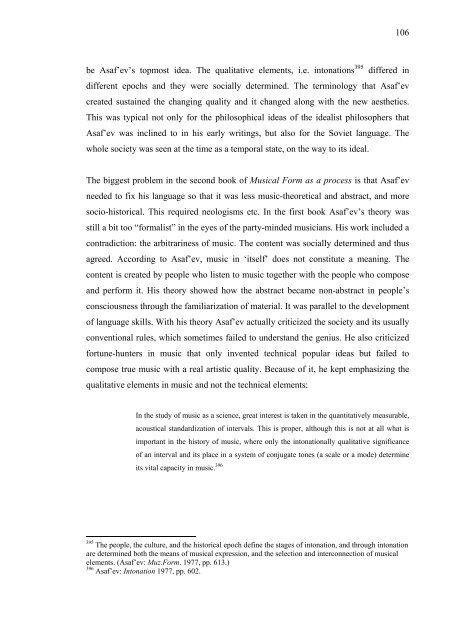Boris Asaf'ev and the Soviet Musicology - E-thesis
Boris Asaf'ev and the Soviet Musicology - E-thesis
Boris Asaf'ev and the Soviet Musicology - E-thesis
Create successful ePaper yourself
Turn your PDF publications into a flip-book with our unique Google optimized e-Paper software.
106<br />
be Asaf’ev’s topmost idea. The qualitative elements, i.e. intonations 395 differed in<br />
different epochs <strong>and</strong> <strong>the</strong>y were socially determined. The terminology that Asaf’ev<br />
created sustained <strong>the</strong> changing quality <strong>and</strong> it changed along with <strong>the</strong> new aes<strong>the</strong>tics.<br />
This was typical not only for <strong>the</strong> philosophical ideas of <strong>the</strong> idealist philosophers that<br />
Asaf’ev was inclined to in his early writings, but also for <strong>the</strong> <strong>Soviet</strong> language. The<br />
whole society was seen at <strong>the</strong> time as a temporal state, on <strong>the</strong> way to its ideal.<br />
The biggest problem in <strong>the</strong> second book of Musical Form as a process is that Asaf’ev<br />
needed to fix his language so that it was less music-<strong>the</strong>oretical <strong>and</strong> abstract, <strong>and</strong> more<br />
socio-historical. This required neologisms etc. In <strong>the</strong> first book Asaf’ev’s <strong>the</strong>ory was<br />
still a bit too “formalist” in <strong>the</strong> eyes of <strong>the</strong> party-minded musicians. His work included a<br />
contradiction: <strong>the</strong> arbitrariness of music. The content was socially determined <strong>and</strong> thus<br />
agreed. According to Asaf’ev, music in ‘itself’ does not constitute a meaning. The<br />
content is created by people who listen to music toge<strong>the</strong>r with <strong>the</strong> people who compose<br />
<strong>and</strong> perform it. His <strong>the</strong>ory showed how <strong>the</strong> abstract became non-abstract in people’s<br />
consciousness through <strong>the</strong> familiarization of material. It was parallel to <strong>the</strong> development<br />
of language skills. With his <strong>the</strong>ory Asaf’ev actually criticized <strong>the</strong> society <strong>and</strong> its usually<br />
conventional rules, which sometimes failed to underst<strong>and</strong> <strong>the</strong> genius. He also criticized<br />
fortune-hunters in music that only invented technical popular ideas but failed to<br />
compose true music with a real artistic quality. Because of it, he kept emphasizing <strong>the</strong><br />
qualitative elements in music <strong>and</strong> not <strong>the</strong> technical elements:<br />
In <strong>the</strong> study of music as a science, great interest is taken in <strong>the</strong> quantitatively measurable,<br />
acoustical st<strong>and</strong>ardization of intervals. This is proper, although this is not at all what is<br />
important in <strong>the</strong> history of music, where only <strong>the</strong> intonationally qualitative significance<br />
of an interval <strong>and</strong> its place in a system of conjugate tones (a scale or a mode) determine<br />
its vital capacity in music. 396<br />
395 The people, <strong>the</strong> culture, <strong>and</strong> <strong>the</strong> historical epoch define <strong>the</strong> stages of intonation, <strong>and</strong> through intonation<br />
are determined both <strong>the</strong> means of musical expression, <strong>and</strong> <strong>the</strong> selection <strong>and</strong> interconnection of musical<br />
elements. (Asaf’ev: Muz.Form. 1977, pp. 613.)<br />
396 Asaf’ev: Intonation 1977, pp. 602.

















